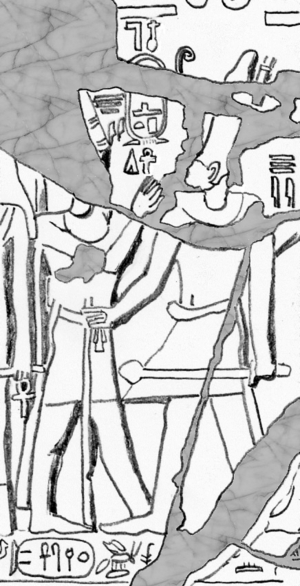Neferhotep III facts for kids
Quick facts for kids Sekhemre Sankhtawy Neferhotep III |
|
|---|---|

Neferhotep III (right) on a stone monument called a stela.
|
|
| Pharaoh | |
| Reign | 1 year c. 1629-1628 BC (16th Dynasty) |
| Predecessor | Sobekhotep VIII |
| Successor | Seankhenre Mentuhotepi |
Neferhotep III was an ancient Egyptian pharaoh who ruled around 1629 BC. His full royal name was Sekhemre Sankhtawy Neferhotep III. He was a king of the 16th Dynasty, a period when Egypt was divided. His kingdom was based in the southern city of Thebes.
Neferhotep III had a very short reign, ruling for only about one year. This was a difficult time in Egyptian history, and his rule was filled with challenges like feeding his people and defending his land.
Contents
How We Know About Neferhotep III
Because he ruled for such a short time, there are not many records of Neferhotep III. Most of what we know comes from a few important ancient sources.
A Special Stone Tablet
The main source of information about this pharaoh is a carved stone tablet called a stela. Although the stela is damaged, the writing on it gives us important clues about his reign.
On the stela, Neferhotep III calls Thebes "my city" and praises himself as "the guide of victorious Thebes". This tells historians that he probably only ruled over the area around Thebes, not the whole of Egypt. His kingdom was likely small, controlling a part of the Nile River valley.
The Turin King List
Neferhotep III is also mentioned on the Turin King List. This is a famous ancient papyrus that lists many of the pharaohs of Egypt and how long they ruled. The list confirms that a king with a name similar to Neferhotep's ruled for one year, which historians believe was him.
A Challenging Reign
Neferhotep III's time as pharaoh was very difficult. His kingdom faced serious problems, including hunger and threats from invaders.
Facing Famine
On his stela, Neferhotep III describes himself as a leader who "nourishes his city, saving it from famine". A famine is a time when there is not enough food for everyone. His royal name, Sekhemre Sankhtawy, also means "The power of Ra, who feeds the Two Lands".
These clues suggest that the people in his kingdom were struggling with hunger. Neferhotep III wanted to be seen as a strong king who could provide for his people during this hard time.
Defending His Kingdom
Besides famine, Neferhotep III also had to protect his kingdom from enemies. He fought a defensive war against a group of people known as the Hyksos, who ruled northern Egypt.
On his stela, he calls himself "He who raises his city, having been sunk through strife with foreigners". This shows he was trying to protect Thebes and its people from outside attacks. After his short reign, he was succeeded by another king, Seankhenre Mentuhotepi, who also ruled for only a short time. This shows how unstable this period of Egyptian history was.
A New Royal Crown
The stela of Neferhotep III is also special because it might show the first-ever picture of a pharaoh wearing the Khepresh, also known as the Blue Crown. This type of crown later became a famous symbol of pharaohs, especially when they were shown as powerful warriors. The stela says Neferhotep is "Adorned with the Khepresh, the living image of Re, lord of terror". This connected him to the powerful sun god Ra.
A Mysterious Extra Name
For reasons historians don't fully understand, the stela also gives Neferhotep III another name: Iykhernofret. This name is written inside a cartouche, which is an oval shape used only for the names of kings and queens. It remains a small mystery about this ancient pharaoh.
|
 | John T. Biggers |
 | Thomas Blackshear |
 | Mark Bradford |
 | Beverly Buchanan |

